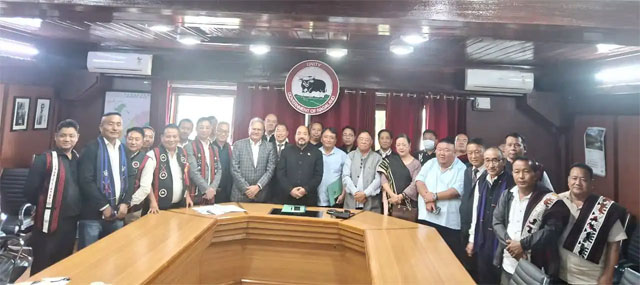Daijiworld Media Network - Kohima
Kohima, Aug 7: The 5 Tribes Committee on Review of Reservation Policy (CoRRP) has firmly rejected the Nagaland government’s decision to constitute a 7-member Job Reservation Commission (JRC), calling it a "repetition" of past measures that ignore the core demands of the agitating tribes.
The rejection comes in response to the state cabinet’s resolution, passed during a meeting chaired by Chief Minister Neiphiu Rio, to set up the JRC to examine and recommend changes to Nagaland’s 48-year-old reservation policy in state jobs. The Commission is to be headed by a retired senior IAS officer and include members from three major civil society groups — Eastern Nagaland Peoples' Organisation (ENPO), Central Nagaland Tribes Council (CNTC), and Tenyimi Union Nagaland (TUN) — alongside three government officials.

However, the CoRRP, representing five influential Naga tribes — Ao, Sumi, Lotha, Rengma, and Angami — expressed strong discontent, accusing the government of once again failing to address the primary issue: a comprehensive and impartial review of the reservation structure for Backward Tribes (BT).
In its official statement, the CoRRP criticised the inclusion of CSOs like the ENPO, CNTC, and TUN in the commission, alleging that such representation introduces bias and lacks neutrality, further undermining the legitimacy of the panel.
“This reflects a partisan approach and fails to genuinely engage with the concerns raised by the 5 Tribes CoRRP. The government’s move ignores the demand for an impartial and expert-led commission,” the statement read.
The current reservation system in Nagaland, introduced in 1977, originally allocated 25% reservation for seven backward tribes in non-technical, non-gazetted roles, intended for a 10-year period. Over the decades, this has expanded to 37%, with 25% reserved for Eastern Nagaland tribes and 12% for four other backward tribes.
The 5 Tribes Committee argues that the social, economic, and educational landscape has changed dramatically since 1977, rendering the reservation model outdated and inequitable. They demand a fresh data-driven reassessment to ensure fairness and representation across all communities.
The discontent has already sparked two rounds of mass agitation:
• On May 29, large-scale protest rallies were held across multiple district headquarters.
• On July 9, thousands dressed in traditional attire gathered outside the Civil Secretariat in Kohima, reiterating their demand for policy review.
In response to the cabinet’s decision, the CoRRP has announced plans to convene a joint meeting with apex tribal bodies of the five communities to determine the next course of action, hinting at the possibility of renewed agitation.
The situation highlights a growing rift between the state government and influential tribal organisations, with concerns that the current policy no longer reflects ground realities or ensures equitable opportunities in state employment.
As the demand for reservation reform continues to build momentum, all eyes are now on how the state government will respond to the deepening dissatisfaction among Nagaland’s powerful tribal constituencies.